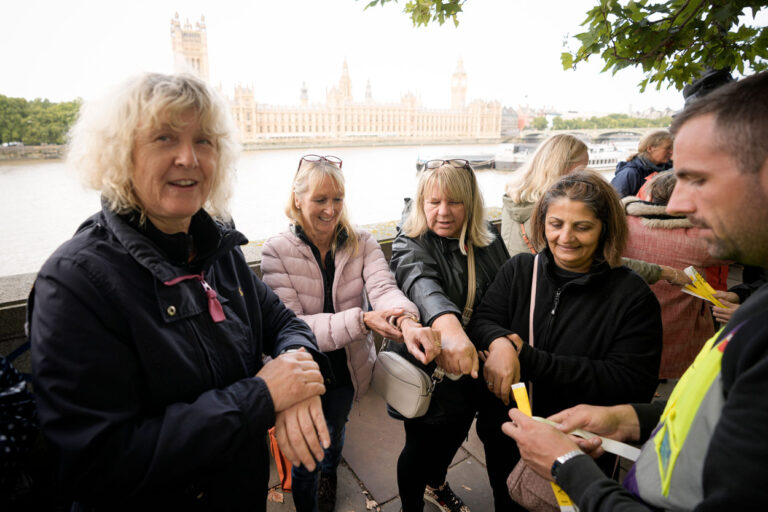Inside the Queen’s lying-in-state trade where paper wristbands are bid for thousands
With a fourth Prime Minister in six years, more food banks than McDonald’s and a falling pound sterling, it’s clear that Britain is living up to the derisive #normalisland. And now, there seems to be yet another chapter added to the ‘I’m a Briton… Get me out of here’ chronicle: a rising online trade where people bid thousands for a piece of paper. As if it couldn’t get any more dystopian.
Whether you’re in favour of the royals or not, there is one thing I think we can all agree on: splashing up to £70,000 on a wristband from the Queen’s lying-in-state as the country enters a literal recession is pretty absurd.
The great British wristband gold rush
The UK is currently undergoing a wristband gold rush, for lack of a better term. According to a report by The Guardian, some of these wristbands have attracted bids of up to £70,000 on eBay—causing the e-commerce giant to step in and remove them off its site.
Although £70,000 may be the extreme end of the spectrum, online marketplaces have seen an influx in sellers attempting to flog their own lying-in-state memorabilia for a quick buck. Prices vary widely and depend on the condition of the paper. As of writing this article, the majority of online listings land somewhere within the triple-figure range—with some being auctioned as low as £30.
It should be noted that the legitimacy of these bids is up for question, as reported by the BBC. However, regardless of the price, the existence of this bizarre trade stirs up conversations that are far from paper-thin: it reflects British identity, what impact the Monarch has on our collective psyche and why, as humans, we have an unshakable desire to hoard historical artefacts.
Why would people fork out £70,000 for a… paper wristband?
To understand why on earth these items are being listed for eye-watering amounts of money, we first need to look at our own psychology. Collecting memorabilia is part of being human—it’s in our DNA to place meaning on items, author and psychotherapist, Charlotte Fox Weber, explained.
“We try to hold onto the sand of time by preserving and treasuring certain objects. We express and select what feels important to us, and our belongings can give us a sense of identity, narrative, and meaning,” Weber told SCREENSHOT.
“Royals evoke deep fantasies of glory, and the stories and myths and beliefs are a tantalising mix of real and made up. We’re gripped by the fact that the Queen was an ordinary mortal human being in some ways, and she was also utterly exceptional and overwhelmingly remarkable in other ways,” she continued. “It’s almost oceanic, the sense of the royals, and I think locating and chronicling bits and pieces gives us a feeling of having something real to hold onto.”
Weber went on to note that, for some people, these paper wristbands act as “trophies” that “give some sense of our own worth—rightly or wrongly. Wristbands are symbolic souvenirs that mark something unmissable, even to those who missed it. Nostalgia for the past (even the recent past) can be packed full of confabulations and embellishments.”
Is this trade actually ethical?
Others hold a different view. Sarah, a 22-year-old History student from Manchester, believes that this trade is exploitative and a reflection of just how unethical online e-commerce trends can be. “I can’t help but feel uneasy about the whole situation,” she shared. “I understand that people want to collect souvenirs of this historic event, sure, but selling these pieces of paper for huge amounts of money while the nation enters a cost of living crisis is absurd.”
“What about royalists who are unable to afford the wristbands?” she questioned. “If the Queen is really part of our collective identity, why is the privilege of holding on to something that apparently embodies this moment only reserved for the rich?”
SCREENSHOT reached out to a number of individuals who were selling lying-in-state wristbands via Facebook Marketplace and Gumtree—but many did not respond to our request for comment. One individual, who asked to remain anonymous and had listed their wristband for £500 on Facebook Marketplace, said that they “didn’t see anything wrong” with putting such a price on the item.
“Personally, I don’t think there is anything wrong with selling these wristbands. I won’t get much value out of this [wristband]. I’ve paid my respects already but maybe it could be of value to someone else,” they added.
It’s clear that these wristbands hold historic significance, and will no doubt be in museums for years to come. What’s less certain, however, is the motivations behind people selling them. Perhaps these listings are made by legitimate, well-meaning individuals who are placing value on what these pieces of paper represent. On the other hand, it could also be a vast amount of people exploiting a country in mourning for a quick (but sizable) chunk of cash.
But hey, with the recent tax cuts for the super-rich—where earners of over a million pounds per year save a whopping £55,220—perhaps crinkled pieces of paper could be a promising investment… Trickle-down economics, right?






